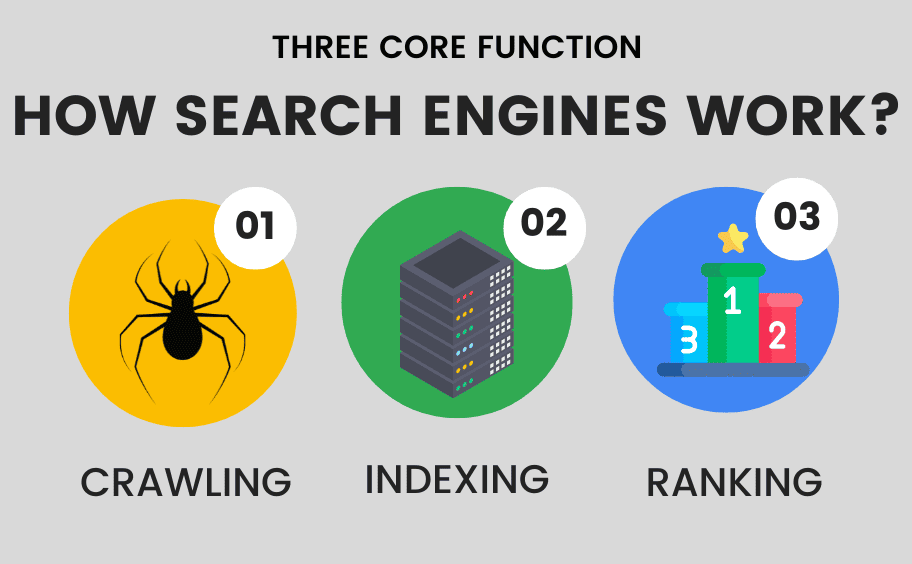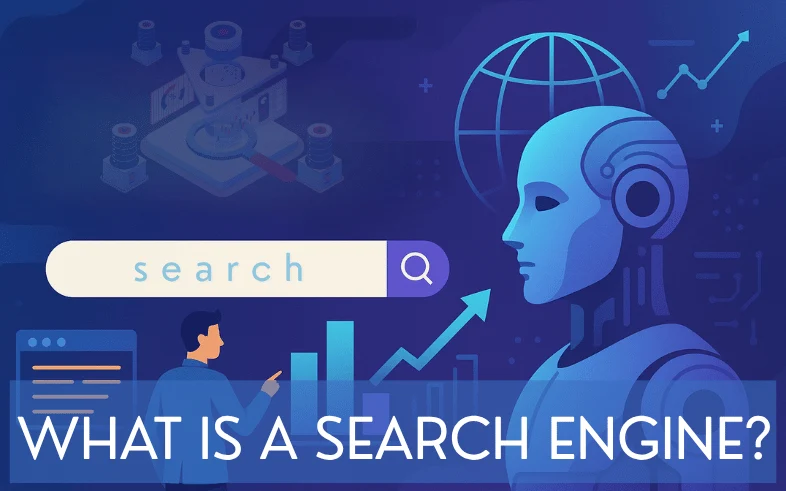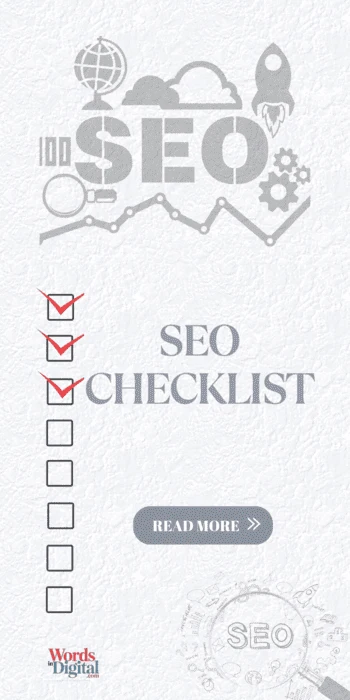Contents
1. Introduction
A search engine is a digital software that scans information on the internet, indexes it in a database, and lists the most appropriate results for the queries made by users.
Search engines, which offer their visitors the content they are looking for among millions of pages, perform this service by crawling web pages with programs such as spiders and bots, indexing the pages they find on their high-capacity servers, and processing this indexed data with their algorithms.
At this stage, let’s first consider the concept of an algorithm and proceed.
A search engine algorithm is a set of mathematical formulas and rules used by search engines, such as Google or Bing, to rank the most relevant results for a search query among billions of pages on the internet.
1.1. Google Algorithms
Due to its market dominance, let’s illustrate the concept of algorithms with examples of the most prominent algorithms developed by Google:
1.1.1. RankBrain (2015):
This machine learning-based system helps Google better understand user queries. It tries to offer the most appropriate result by analyzing intent, especially for queries that have never been encountered before.
1.1.2. BERT (2019):
With natural language processing (NLP) technology, Google no longer understands words, but sentence structure and context. This was especially revolutionary for interrogative sentences and near-speech queries.
1.1.3. MUM (Multitask Unified Model – 2021):
Said to be 1000 times more powerful than BERT, MUM can analyze multilingual, multi-format (text, image, video) content with a single search. For example, if you are looking for mountain climbing equipment, MUM can recommend content from different sources such as blog posts, YouTube videos, forum discussions, etc.
1.1.4. SGE (Search Generative Experience – 2023 and beyond):
This system, which Google has begun to offer AI-generated answers in search results, greatly transforms the traditional link-based search model. Users are no longer just directed to web pages; they can receive summaries, suggestions, and contextual answers to their queries.
1.1.5. Google Algorithm Current Ranking Factors
According to the results of the study conducted by First Page Sage, Google Algorithm Current Ranking Factors are distributed as shown in the table below.
| Factor | Weight |
| Consistent Dissemination of Satisfactory Quality Content | %23 |
| Keyword in Meta Title Tag | %14 |
| Backlinks | %13 |
| Niche Expertise (Topic Clusters – Pillar Content) | %13 |
| User Experience (Bounce rate, time spent on page, and number of pages viewed per session) | %12 |
| Content Up-to-date | %6 |
| Mobile Compatible / Mobile First Website | %5 |
| Reliability | %4 |
| Connection Distribution Diversity | %3 |
| Page Speed | %3 |
| Site Security / SSL Certificate | %2 |
| Internal Links | %1 |
| Keywords in Meta Description Tags + 23 Other Factors | %1 |
1.2. Search Engine Market Shares
As of June 2025, Google is by far the search engine with the highest market share among search engines worldwide, at 89.54%.
Source: gs.statcounter.com
Global Statistics:

2. What is the Purpose of Search Engines?
2.1. Why are Search Engines Free?
When you go to Google and search for something, you are not charged, right?
We even use it many times a day.
So why do these giant companies seem to do this for free?
There is a very powerful business model behind this seemingly free service: Advertisements.
2.2.What is the Main Goal of Search Engines?
The main goal of search engines is to provide users with the most accurate and fastest results.
Why?
Because if you find the answer you are looking for quickly,
➡️ You will use that search engine more.
➡️ More users = more ad impressions
➡️ More advertising = more revenue.
In other words, the search engine that pleases the user wins the most.
2.3.Why Quality Content Stands Out?
Search engines want to please you.
Because that’s the only way you’ll come back.
That’s why they constantly improve their algorithms:
- They weed out spam,
- They push back duplicate content,
- They push relevant and quality content up.
Google, in particular, has become more and more interested in the E-E-A-T (Experience, Expertise, Authority, Trust) criteria, which puts user experience at the center.
2.4.Spam Fighters: Algorithms
Google has hundreds of algorithm updates. Objectives:
- Detecting cheating sites,
- Putting content that is written just to trick the search engine on the back burner,
- Promoting pages that have real value, that benefit the user.
That’s why it’s important to write for people, not just for search engines.
3.What is the Search Purpose of Users?
The goal of search engine users is to find the information, content (images, music, videos, etc.), websites, and products they are looking for in the shortest time and with the least amount of effort.
Therefore, when planning your efforts, in order to get the most efficient results, you need to look at the issue both from the point of view of the search engines and from the point of view of the search engine users who want to reach your site using search engines.
Let’s also give information about the types of searches made as an example.
3.1.Search Types:
We can generally divide the searches into four:
- Informational: “What is SEO?”, “How to brew tea”
- Navigational: “Facebook login”, “Trendyol customer service”
- Transactional: “SEO service prices”, “best vacuum cleaner”
- Commercial Investigation: “iPhone 15 or Samsung S24?
Analysis shows that about 80% of searches are for information.
3.2.What Should You Do as a Website Owner?
Ask yourself this question with every piece of content:
✅ Does this content answer a question?
✅ What might be the user’s goal? Do I meet it?
✅ If the user wants to take action, do I facilitate that step?
Remember: Good content is not just informative; it is content that serves the user’s purpose.
4.How Do Search Engines Work?

The basic operation of search engines is divided into three phases:
Crawling: Pages are found
Indexing: Pages are recorded
Ranking: The most suitable ones move up
Examples of programs that perform these operations: Google – Googlebot, Yahoo – Slurp, Bing – MSNBot.
These bots discover and archive pages by following links on the internet. As a result of the search, it lists the most relevant and popular content at the top.
4.1.What is Indexing?
Indexing is the process by which a web page is crawled, analyzed, and listed in search results by search engines such as Google.
In other words: “Has your web page entered Google’s library?” Indexing is the answer to the question.
4.2.How Does the Indexing Process Work?

This process consists of 3 basic stages:
1. Crawling: Googlebot discovers new pages by following links on the internet. Just like a traveler, it wanders between sites by clicking on each link.
2. Analyzing and Understanding (Parsing): When the bot reaches the page, it reads the content. It analyzes HTML tags, headings, text, and images.
3. Indexing: The page is taken into Google’s database and matched with relevant topics. It is now ready to appear on Google.
4.3.How do you know if your website is indexed?
✅ Type site:yoursitename.com in Google.
If your pages are listed, it is indexed.
✅ Use Google Search Console.
Here you can access details such as the index status of your pages, errors, and crawling problems.
5. What are the Popular Search Engines?
The most used search engines worldwide are the following:
5.1. Google
Google is the world’s most popular search engine with more than 90% market share. It stands out with its advanced algorithms, artificial intelligence-supported results, and design that prioritizes user experience.
5.2. Bing
Bing, developed by Microsoft, is widely used, especially because it is integrated into Windows devices. Strong in image searches and news results.
5.3. Yahoo
Once one of the most popular search engines, Yahoo now uses Bing’s infrastructure. In particular, it is integrated with email services and news portals.
5.4. Yandex
Based in Russia, Yandex is strong in Eastern Europe. It stands out with its integrated services such as maps, e-mail, and translation.
5.5. Baidu
This China-based search engine is optimized for users in China and complies with government regulations.
6. What are the Alternative Search Engines?
Apart from the popular search engines, there are alternative options for users who value privacy and private search needs:
6.1. DuckDuckGo
It is a privacy-focused search engine that does not save users’ search history. Offers an ad-free and tracking-free search experience.
6.2. StartPage
Uses Google’s search results but does not collect user data. Complies with European privacy laws.
6.3. Ecosia
It is an environmentalist search engine that plants trees with the proceeds of every search. It combines both social responsibility and basic search needs.
7.Social Media Search Engines
Today, users want to access information not only through traditional search engines but also through social media platforms. Social media search engines respond to this need.
1. Facebook Search
It allows you to search through people, groups, pages, events, and posts.
2. Twitter Search
It is used to quickly find real-time developments, trends, and user content. It is especially effective for news tracking.
3. LinkedIn Search
It allows you to search for professional people, companies, job postings, and content.
4. YouTube Search
It is the world’s largest platform for video-based content searches. SEO (search engine optimization) is also important here.
Social media search engines provide personalized results based on users’ interests, which creates a significant digital marketing opportunity for content creators.
You can share this article on social media or get a summary with ChatGPT / Perplexity:



 Share
Share X
X ChatGPT
ChatGPT Perplexity
Perplexity









